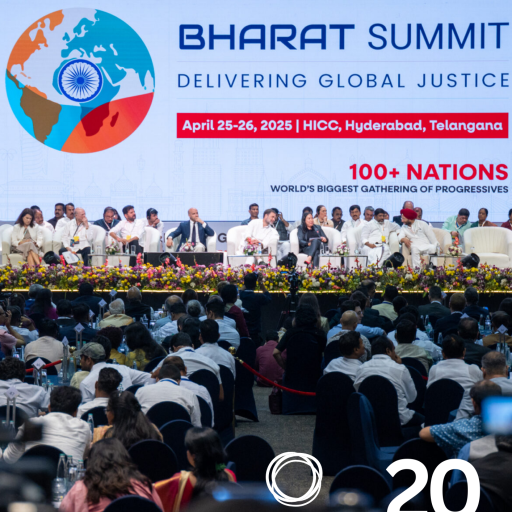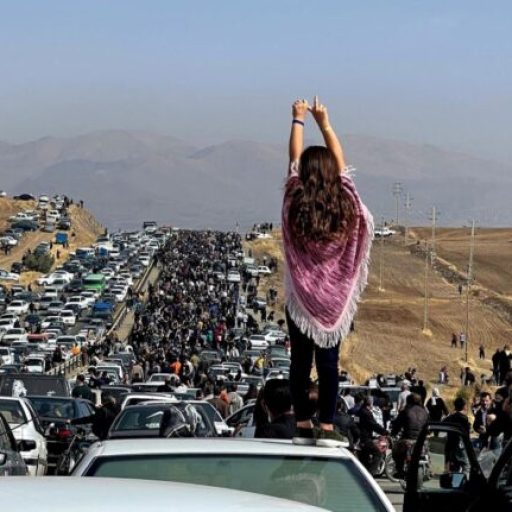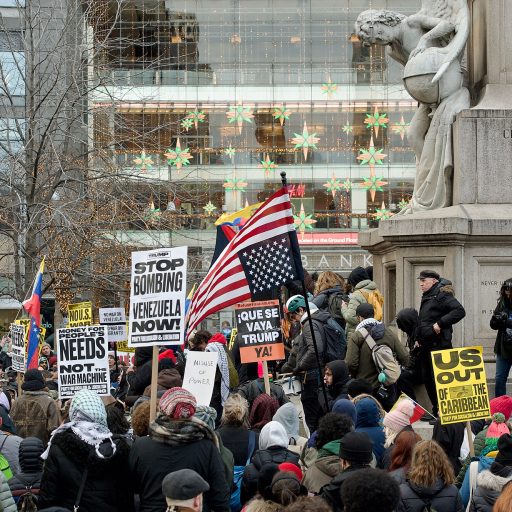Why we struggle even harder for justice – human rights and democracy today
By Laureate Loretta Ann “Etta” P. Rosales, Chair emeritus of AKBAYAN, Philippines
In behalf of AKBAYAN, may I express our profound Muchísimas Gracias to the Progressive Alliance for this great honor which you bestow on AKBAYAN and myself.
This tribute you give us humbles us deeply. And much as we are humbled, we are honored and … most pleasantly surprised, and I speak especially for myself. After all, we are not used to receiving awards of this kind. Particularly in the Philippines today, it is not fashionable to give awards to people who stand for the right to life, to seek justice for redress of grievances, for gender equality and for defending the right to free expression when this is attacked. I cannot imagine the Philippine President, Rodrigo Duterte, including programs of this kind in his national development and social welfare agenda.
Mr. Duterte won not by a majority vote but by plurality – 38% in the 2016 presidential polls. However, his margin over the Liberal Party candidate, Mar Roxas, was six million votes and he has never stopped reminding people that this wide margin serves as an indictment of neoliberal-ism, a development paradigm that has kept the oligarchs in power at the expense of the people’s development in the years since Ferdinand Marcos was ousted in 1986.
His presidential campaign promised the people to clean the country of illegal drugs, corruption, criminality, peace and order and poverty alleviation. He told the poor people he was one of them; he knew their unresolved grievances, their curses, and their betrayal by the elites.
Within the year that he took over as President in 2016, he attacked powerful institutions whom he blamed as part of this oligarchic and corrupt rule: mainstream media, the Catholic Church, even the Commission on Human Rights and corrupt politicians linked to the deadly drug trade that was destroying “his country”.
He admitted that the main source of the illegal drug trade came from China, but by destroying the infrastructure of drug demand, the drug cartels would lose their market. So, upon assumption into office on July one, he made it official policy to relentlessly destroy the market for illegal drugs, a campaign he had started to wage the day after he won his presidential bid on 9 May.
He tried to convince the people that dangerous drugs were the source of crime and drug users addicted to the illegal substance were dysfunctional members of society who were the source of violence and criminality. With this he justified summary killings of the very people whose lives he promised to salvage from poverty, the thousands of poor people who voted him into office.
By January of 2017, the Philippine National Police gave a report of a total casualty of 7,000 drug users and peddlers with 2,500 resulting from buy-bust police operations. This figure would grow to an ambiguous 13,000 by mid-August 2017. Protests by the international human rights com-munity led by UN special rapporteurs and including the Progressive Alliance against these killings generated venom in the mouth of Duterte who threatened to pull the Philippines out of the United Nations. When the European Union underscored human rights as an underpinning of the GSP+ trade benefits which should be encouraged in improving the economic life especially of the poorer sections of society, Duterte threatened to cut diplomatic relations with its members.
But even beyond the difficulties in the Philippines today, it is no secret that I had a chance to scan the network of members of the Progressive Alliance and I have been properly impressed at the array of progressive political parties, a number of which now find themselves at the head of governance.
In Mongolia, the party who hosted our conference, the Mongolian People’s Party (MPP) is the organization running government. Your experiences are qualitatively different from what we have yet experienced in AKBAYAN. We still have much to learn from you in the way you are mandated to address complex concerns of governance that span the economic, socio-cultural and political fields of endeavor. We are fully aware of your difficulties in producing food for the people from a hostile physical terrain in much the same way we are overwhelmed by the advance that Costa Rica has made in protecting her environment and making its precious natural resources productive for her people.
Experiencing Mongolia and now Costa Rica gives us a sense of stronger solidarity for the present and hope for the future. it is a good feeling to be together and know that sister parties who now give direction to programs of governance against the onslaught of global fundamentalism and populism inspire emerging political parties such as ours, as we continue to defend our shared visions for greater equality without discrimination, for human dignity, gender justice and human rights, for freedom and solidarity among our peoples and those of the world.
And now may I go to the rationale of the tribute you give me and Akbayan. You cite the long struggle we had to engage in to rid our people of the dictator Ferdinand Marcos and the subsequent struggle we pursued, after the dictator’s ouster, to get the State to recognize its account-ability to the people. I thank you for this and I am proud to let you know that indeed Akbayan, as representative in the Philippine Congress was among the principal authors of Republic Act 10368 which now provides for the recognition and reparation to victims of human rights violations under the Marcos Regime. Today 75,730 applicants for compensation and reparation are being verified and validated by the Human Rights Violations Victims Claims Board, an entity created by the law for this purpose.
The law is significant in the way that this, I believe, is a pioneering piece of legislation in Asia and perhaps beyond, where a state is made responsible and accountable for gross violations of human rights committed against the people. Its implementation is an indictment of an historical crime that has wreaked the lives of the people across generations – the crime of impunity.
Impunity can only be committed from an ideological mindset that government is established to entitle the few, who hold positions of state power, unlimited authority to self-perpetuate as sovereign and sole representatives of that state. Democratic governance, on the other hand, derives state power from the sovereign will of an informed and empowered people. It enforces the rule of law from below and exercises due process. It prevents the monopoly of state power through the principle of checks and balance. This principle, in turn, institutionalizes division and delegation of authority to constitutional bodies and branches of governance.
When institutional check and balance, however, is trampled upon with the use of coercion, armed force and violence, only a critical mass of informed and empowered citizens can challenge this coercive rule of power. In the recent political experience of the Philippines, the EDSA Revolution ousted a dictator by an enraged people who struggled to restore democracy, social justice and human rights. Internally, the resistance to Marcos saw the convergence of various sectors that saw the split in the factions of the military and big business. Externally, the solidarity of friends, of kindred spirits who supported our struggle against one-man-rule pressured their governments to withdraw support to the dictator.
When President Reagan saw how Marcos was morally discredited and politically isolated by the Filipino nation, with the military divided, Reagan instructed his envoy to Marcos, Senator Paul Laxalt, to tell Marcos to “cut and cut cleanly”. Marcos was no longer the solution; he was the problem and could no longer be relied on to defend American interests in Southeast Asia.
You use the term “Political Courage” in giving this award and, while we are profoundly thankful to you, it still sounds formidable. Was it Winston Churchill who once said that, while it is an act of courage to be able to stand up and fight for your rights, it is equally an act of courage to be able to sit down and listen to others.
The other day before I left for Costa Rica, we held a quiet and confidential conversation with eight grieving women, seven of them mothers and one a young widow. As family victims of the War on Drugs, they came to share their stories of blood and pain and sweat and sorrow.
Most of their children were brutally gunned down while some were beaten up before being killed in the latter months of 2016. The culprits were mostly plainclothes men with masks and bonnets. Some of the victims – in their late teens and early twenties – were killed in their homes, the others while walking down the streets. The husband of the young mother was carrying his two-year-old baby when he went out to buy milk for the child. The wife was doing errands in the neighborhood when she heard shots. She quickly told her friend that she should go home and warn her husband about those shots until someone ran to her screaming that they had shot her husband. The culprits told the husband to put the baby down and the moment he gave the baby to someone, they shot him. He was brought to the hospital and died a few days after.
One mother saw her son arrested at nine in the morning by the police so she asked to be with her son. They refused to let her ride the police van, so she got the precinct address and followed them. When she got to the precinct, the police told her they were giving him breakfast and asking him some questions. At around 11:00 a.m. they came out carrying a young man with shorts but her son had long pants. Nonetheless this alarmed her and she insisted that she see her son. After a while, a policeman approached her and said if you wish to see your son, you go to Tala, a short distance away. She went to the place. A van was there with no plate number and from the van a body was thrown into the street. The lifeless body was that of her son who was wearing shorts. They had apparently changed his pants and covered his face earlier at the precinct to hide him from the mother. At this time, it was already 12:00 noon. The mother suspects her son was beaten up and perhaps killed in the van.
The reason for the killings? They were pointed out as drug users, peddlers, runners, or they happened to be “collateral damage” during police buy-bust operations; or the police needed to fill up their quota of drug targets for the week.
When I asked the mothers if they had approached any of the authorities or even the church to ask for help, they said initially they were too busy looking for medicine to save the life of their sons and for those whose sons were immediately killed, there was no time for grief as they needed to get funeral funds which on the average ranges from P40,000 to P80,000. This is expensive for families who earn anywhere from P200 to P300 daily.
But did you try to reach the Mayor or seek help from the Church? “No, because if we went to them to complain, they would ask us for evidence and they would ask us many questions that we know we cannot answer. The men wore masks, the policemen were in hearing distance of the shots, and we cannot reach the Mayor and we don’t know if he can help”.
And the Church? “We have not tried. Our parish priest is not very friendly although he says it is a sin to kill, according to the Commandments”.
What was the message here that we should listen to? We have heard of the war on drug killings – thousands of them. But these are statistics thrown at us. Each mother, holding back her tears as she recalls how her son was killed a year ago tells us how utterly irrelevant local government is to them in their time of pain. Church is a matter of having a friendly or unfriendly parish priest. Even friends in the neighborhood stayed away from the wake they gave their children for fear the police would take them as suspects in drug use or drug peddling.
So, what does this say to us? Over the year, the brutality of the way the war on drugs was en-forced from above has resulted in a chilling climate of fear where armed violence from policemen and vigilantes ruled, resulting in the killing of thousands of citizens with ambiguous figures ranging from 8,000 to 13,0000 casualties, depending upon who is giving the report. Local government has been effectively paralyzed and neutralized in providing protection and security for its residents in their own homes and environs. It also has shown its incapacity to maintain a semblance of peace and order in the communities on which it presides.
The paralysis of many functioning local governments stems from the fact that the names of their mayors and governors are in a thick book consisting of a long list of so-called “Narco-Politicians” which the President flaunts to all and sundry each time he addresses a crowd. He threatens politicians that should they not comply with his war on drugs, this List of Narco-Politicians might rapidly transform into a List of Death Certificates.
Hence, the people expect little from local government today regardless of how post-Marcos local governments have been strengthened in the exercise of political power by the post-Marcos legislation entitled “The Local Government Code”. The other branches of power and the Constitutional bodies that are mandated to serve as check and balance to executive abuse are now being effectively silenced through a series of impeachment complaints being filed against them: The Chief Justice of the Supreme Court, the Chair of the Commission on Elections and now the Ombudsman have all had their share of impeachment complaints filed within the year.
On the other hand, the brutal slaying of three young teen-agers by policemen last August 2017 has generated public outrage that forced the Palace to promise a thorough investigation of the young people’s deaths. Equally, a discredited Philippine National Police was ordered to step back with the legally mandated Philippine Anti-Drugs Enforcement Agency (PDEA) to take over as provided by RA 9165, the Dangerous Drugs Act.
Media surveys have currently shown a plummeting of trust ratings on President Duterte’s ability to fulfill the four promises he had made when he was newly elected as President: i.e.,
1) solving the illegal drug problem as menace to Philippine society;
2) ending criminality and corruption
3) peace and order, including forging a peace accord with the CPP/NPA and the Bangsamoro
4) alleviation of poverty
But these are specific indicators that show that the see-saw battle of creeping authoritarianism against democratic rule will continue to dominate the playing field. It is in this broad context where solidarity plays a crucial role.
May I then express once more our deep gratitude to the Progressive Alliance for its timely visit some weeks back when a delegation led by Konstantin took time to discuss with the Commission on Human Rights and members of the Catholic Church the urgent issues on the ground. The delegation visited the market where blood had been spilt from hundreds of poor and young people suspected of using drugs. As we thank you today, we equally appeal to you to sustain this invaluable support you give us in these crucial times. Things are still going to worsen before they get better. But they can only get better when an informed and empowered citizenry rises up to defend its rights that are being trampled upon and the democratic institutions it restored from the ouster of dictatorial rule.
Let me therefore end with a piece of wisdom from Eleanor Roosevelt in commemorating in 1958 a decade of the establishment of the Universal Declaration of Human Rights:
“Where after all do universal human rights begin? In small places, close to home – so close and so small, they cannot be seen on any map of the world. Yet they are the world of the individual person: the neighborhood he lives in; the school or college he attends; the factory, farm or office where he works. Such are the places where every man, woman, and child seeks equal justice, equal opportunity, equal dignity without discrimination. Unless these rights have meaning there, they have little meaning anywhere. Without concerted citizen action to uphold them close to home we shall look in vain for progress in the larger world”.
Muchísimas Gracias otra vez!





![Headline: Hier bitte das Thema [ Headline] 24.10.25, Lucerne, Switzerland, Progressive Alliance PA women conference](https://progressive-alliance.info/wp-content/uploads/elementor/thumbs/MAW251024mw859033AdobeRGB-scaled-recq0qxu9kb6pncdi2i7wo6ttne03ppnu58zxxdc74.jpg)
![Headline: Hier bitte das Thema [ Headline] 25.10.25, Lucerne, Switzerland, Progressive Alliance PA women conference](https://progressive-alliance.info/wp-content/uploads/elementor/thumbs/MAW251025mw860402AdobeRGB-scaled-recs8kegm3kqlleif2kq512xsjz2qfl3t7kc0t0tts.jpg)